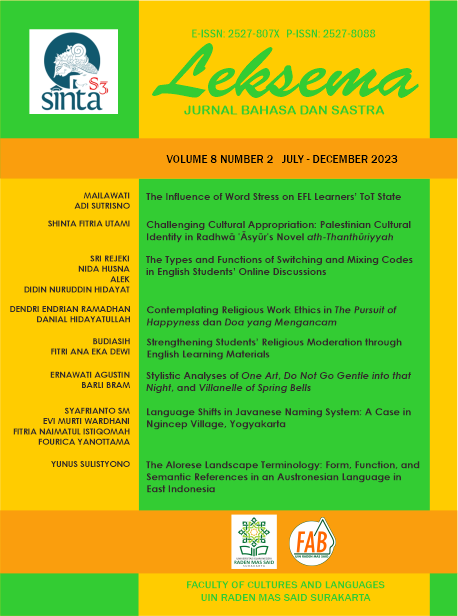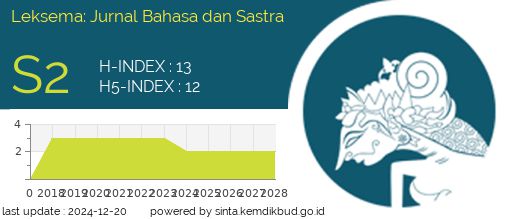CONTEMPLATING RELIGIOUS WORK ETHICS IN 'THE PURSUIT OF HAPPYNESS' AND 'DOA YANG MENGANCAM'
DOI:
https://doi.org/10.22515/ljbs.v8i2.6513Keywords:
comparative literature, film, Islam, Protestant, religious work ethicsAbstract
The two films The Pursuit of Happyness (2006) and Doa yang Mengancam (2008) as the representations of Protestant and Muslim communities both demonstrate significant implications toward the dynamics of work ethics. The problem addressed by this comparison of two cinematic works is the influences of two different religious values on personal work ethics. The foundation of comparative literature paradigm is the idea that by studying literary works from various cultural and linguistic contexts, we can better understand how historical and cultural situations form human experiences--in this case, religious work ethics--occur. The aim of this research is to compare the representation of work ethics within the two main characters in the films as influenced by their respective religious values. The theory used for solving the case is Stuart Hall's (1997) representation theory by using the constructivism paradigm (symbolic, image, discursive, and myth function) with qualitative research method. The findings show that Chris, as a Protestant, has higher work ethics than Madrim, a young Muslim, according to Max Weber's Protestant Ethic principles. However, this situation has an impact on the Protestant’s attitude which is more materialistic than that of the Muslim which shows an equality between worldly wealth and good deeds in the afterlife.
Downloads
References
Anam, Khoirul. 2018. “Pengaruh Etos Kerja dan Disiplin Kerja Terhadap Peningkatan Ekonomi Pekerja Kuli Angkut (Manol) Di UPT TPI Mayangan Kota Probolinggo”. ECO 8 (4): 1–12.
Arslan, Mahmut. 2020. "The Work Ethic of Medieval Muslim Ahi Brotherhood: A Comparison with Catholic and Puritan Work Ethics". Bussecon Review of Social Sciences (2687-2285) 2 (2): 1–13. https://doi.org/10.36096/brss.v2i2.201.
Auerbach, Erich. 1957. Mimesis: The Representation of Reality in Western Thought. New York: Princeton University Press.
Blizek, William L, Michele Marie Desmarais, and Ronald R Burke. 2011. "Religion and Film Studies through the Journal of Religion and Film". Religion. https://doi.org/10.1080/ 0048721X.2011.590698.
Bramantyo, Hanung. 2008. Doa yang Mengancam (Film). SinemArt Pictures.
Furnham, Adrian and Clare Muhiudeen. 2010. "The Protestant Work Ethic in Britain and Malaysia". The Journal Of Social Psychology.
GC, Saroj. 2015. "A Critique on the American Dream: Egalitarian American Dream, Racial Shadows and The Pursuit of Happyness". The Batuk 1 (1): 90.
Gorsuch, Richard L. 1994. "Toward Motivational Theories of Intrinsic Religious Commitment". Vol. 33.
Hall, Stuart. 1997. Representation: Cultural Representations and Signifying Practices. London: SAGE Publication.
Hellriegel, Don and John W Slocum. 2011. Organizational Behavior. South-Western Cengage Learning.
Indartono, Erwin Prasetio Raharjo and Prasetyo Budi Widodo. 2014. “Hubungan Kepuasan terhadap Gaji dengan Etos Kerja Karyawan KPRI di Kota Semarang”. Jurnal Empati 3 (4): 172–81. https://doi.org/10.14710/empati.2014.7571.
Irham, Mohammad. 2012. “Etos Kerja dalam Perspektif Islam”. Jurnal Substantia 14 (1): 11-24.
Junhong, Ren. 2014. "Cultural Interpretation of the Pursuit of Happyness". https://doi.org/10.2991/icassr-14.2014.5.
Merriam, Sharan B, and Elizabeth J Tisdell. 2015. Qualitative Research: A Guide to Design and Implementation. California: Wiley.
Metz, Christian. 1991. Film Language: A Semiotic of the Cinema. Edited by Michael Taylor. Chicago: University of Chicago Press.
Ramrao, Totawad. 2016. "Film and Literature: An Overview". http://www.epitomejournals. com.
Shirokanova, Anna. 2015. "A Comparative Study of Work Ethic among Muslims and Protestants: Multilevel Evidence". Social Compass 62 (4): 615–31. https://doi.org/10.1177/0037768615601980.
Stam, Robert. 1992. New Vocabularies in Film Semiotics: Structuralism, Post-Structuralism and Beyond. Edited by Edward Buscombe (1st ed.). Routledge.
StudyCorgi. 2023. "Psychology in The Pursuit of Happyness Film". February 23. https://studycorgi.com/psychology-in-the-pursuit-of-happyness-film/.
Tamam, Badrut. 2019. “Pesan Dakwah tentang Ka’ifiyah Doa dalam Film Doa yang Mengancam”. Semarang: UIN Walisongo.
Titisari, M Warso, and Andi Haryono. 2016. “Analisis Pengaruh Karakteristik Organisasi, Etos Kerja dan Disiplin Kerja terhadap Performa Perusahaan dengan Efektivitas Kinerja Karyawan sebagai Variabel Intervening (Studi Kasus Pada PT Indofood Semarang)”. Journal Of Management 2 (2).
Turner, Graeme. 1999. Film as Social Practice, Third Edition (3rd ed.) London: Routledge.
Weber, Max. 1905. The Protestant Ethic and the Spirit of Capitalism. Routledge.
Wellek, René and Austin Warren. 1948. "Theory of Literature". http://www.archive.org/details/ theoryofliteratuOOinwell.
Zinnbauer, Brian J, Kenneth I Pargament, Brenda Cole, Mark S Rye, Eric M Butter, Timothy G Belavich, Kathleen M Hipp, Allie B Scott, and Jill L Kadar. 1997. "Religion and Spirituality: Unfuzzying the Fuzzy". Vol. 36.
Downloads
Published
Issue
Section
License
Copyright (c) 2023 Leksema: Jurnal Bahasa dan Sastra

This work is licensed under a Creative Commons Attribution-NonCommercial-ShareAlike 4.0 International License.
The copyright of the received article shall be assigned to the publisher of the journal. The intended copyright includes the right to publish the article in various forms (including reprints). The journal maintains the publishing rights to published articles.
In line with the license, the authors and users (readers or other researchers) are allowed to share and adapt the material only for non-commercial purposes. In addition, the material must be given appropriate credit, provided with a link to the license, and indicated if changes were made. If authors remix, transform or build upon the material, authors must distribute their contributions under the same license as the original.







